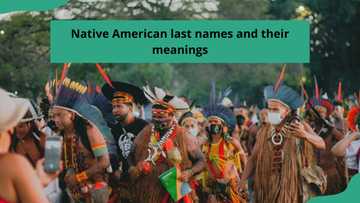30+ fascinating Spanish last names/surnames and their meanings
Many Spanish last names used today originated from medieval times when it became necessary to distinguish between people who possessed the same name. Today, there are a lot of Spanish surnames that hold meaning and have a deep backstory. What are the most common ones and the more unique ones?

Source: UGC
In Spain, people usually have two surnames, which they inherit from their father and mother. Normally, the kid inherits the first surname out of the two that their father has, and the same happens with the mother's surname.
There are normally four common types of Spanish last names. They are classified as follows:
- Patronymic and matronymic. It was invented to distinguish between two individuals who have the same name by using their father or mother's first name and adding a suffix to it, most frequently "ez" which means "son of." This is how some popular picks like Dominguez, Lopez, Ramirez, or Fernandez came to be.
- Geographic places. There are common Spanish names that are derived from the place that the bearer comes from. Some examples include Serrano (highlander), Vega (meadow), or Mendoza (cold mountain).
- Occupational. This variant normally originated from the job or trade that the bearer was busy with. For instance, Alcaldo was a mayor, Cavallero was a knight or a horseman, and Romero was a pilgrim.
- Descriptive. Finally, this option was based on the physical features or qualities of a particular person. To provide some examples, Bravo was brave, Delgado was thin, and Moreno was brown-haired.
Common Spanish last names
Here are some common Hispanic surnames:
- Gomez - son of Gomesano, a man of the path.
- Rodriguez - son of Rodrigo, powerful ruler.
- Fernandez - son of Fernando, journey.
- Suarez - son of Suero, swine herder.
- Ruiz - son of Ruy, powerful ruler.
- Sanchez- son of Sancho, saintly.
- Lopez - son of Lope, wolf.
- Ramirez - son of Ramiro, famous and wise.
- Alvarez - son of Alvaro, cautious.
- Perez - son of Pedro, stone or rock.
- Torres - the person who lives near a tower.
- Morales - the person who lives near a mulberry or blackberry bush.
- Reyes - king, royal.
- Ramos - olive branch, a palm branch.
- Gonzales - son of Gonzalo, war or battle.
Uncommon Spanish last names
These Spanish names are less common than the ones above, yet they still have an exciting history behind them and are used to this day.

Source: UGC
- Abarca - maker of leather shoes.
- Alcaraz - cherry.
- Barbero - beard, barber.
- Cabrera - a place of goats.
- Candella - chandler, candlemaker.
- Del Campo - the person from the field.
- Echeverria - a place Etxeberria in the Basque country.
- Escarra - left-handed.
- Gabaldon - a place Gabaldon in the Cuenca province.
- Guerra - war, quarrelsome person.
- Ignacio - born from the fire.
- Juaquin - lifted by God.
- Lovato - like a wolf.
- Maduro - sensible and mature person.
- Navar - treeless plateau.
- Nunez - ninth, grandfather.
- Olmeda - stand of elm trees.
- Padron - a town in the Galicia province.
- Quevedo - a place Casa de Quevedo in Albacete.
- Talamantes - a place in Zaragoza province.
Common Hispanic last names
These Hispanic names are used not only in Spain but in a lot of other countries, such as Portugal and the Latin-American world. Sometimes, their local variations are used.
- Rubio - red-haired.
- Ortiz - son of Orti, brave and fortunate.
- Santos - saint, holy.
- Diaz - son of Diego, supplanter.
- Martinez - son of Martin, Mars - the Roman god of war.
- Blanco - white.
- Ortega - nettle plant.
- Cabello - a knight.
- Rivera - river bank, shore.
- Iglesias - church.
Uncommon Hispanic last names
These Hispanic surnames originate from Spanish-speaking countries. They are quite unique.

Source: UGC
- Aguilar - eagle.
- Asturias - a region in Spain; rock, water.
- Bolivar - a small Basque village; mill, meadow.
- Cano - white-haired, old.
- Delgado - thin, delicate, tender, charming.
- Elizondo - the person who lives close to a church.
- Fonseca - the person who lives near a dry spring.
- Guadarrama - the town of Guadarrama, located close to Madrid.
- Huerta - garden, orchard.
- Losa - tile, slab.
- Machado - the person who made hatchets or used them; little hammer.
- Maldonado - badly given, ill-favoured.
- Mata - trees, shrubs, red mat.
- Navarro - someone who originated from Navarre; brown.
- Oleastro - wild olive; the person who lives near a wild olive tree.
- Paredes - the person who lives near a wall.
- Quintana - the person who lives on a piece of land where the rent is a fifth of its produce.
- Rendon - unexpectedly, rashly.
- Salinas - salt worker; the person who lives near a salt mine.
- Toledano - the person from Toledo; hill.
- Urena - the town of Uruena in the province of Valladolid.
- Valiente - brave.
- Vicario - vicar; substitute, deputy.
- Villalobos - the town of Villalobos; town, wolf.
- Zamorano - person who comes from Zamora.
There are a lot of fascinating Spanish last names and meanings behind them. It is always interesting to educate yourself about different names from all over the world.
READ ALSO: 50+ interesting African last names/surnames and their meanings
Legit.ng recently reported about the most exciting African last names and what meaning each of them holds. Ever since old times, they have been passed down generations.
African surnames have a great history behind them, and they are significantly different from the most common ones used in other continents. You can check them out and get inspired.
Source: Legit.ng






